The New Arab Staff
28 December, 2022
At least 48 male Afghan professors have now resigned their roles in protest across Afghanistan.
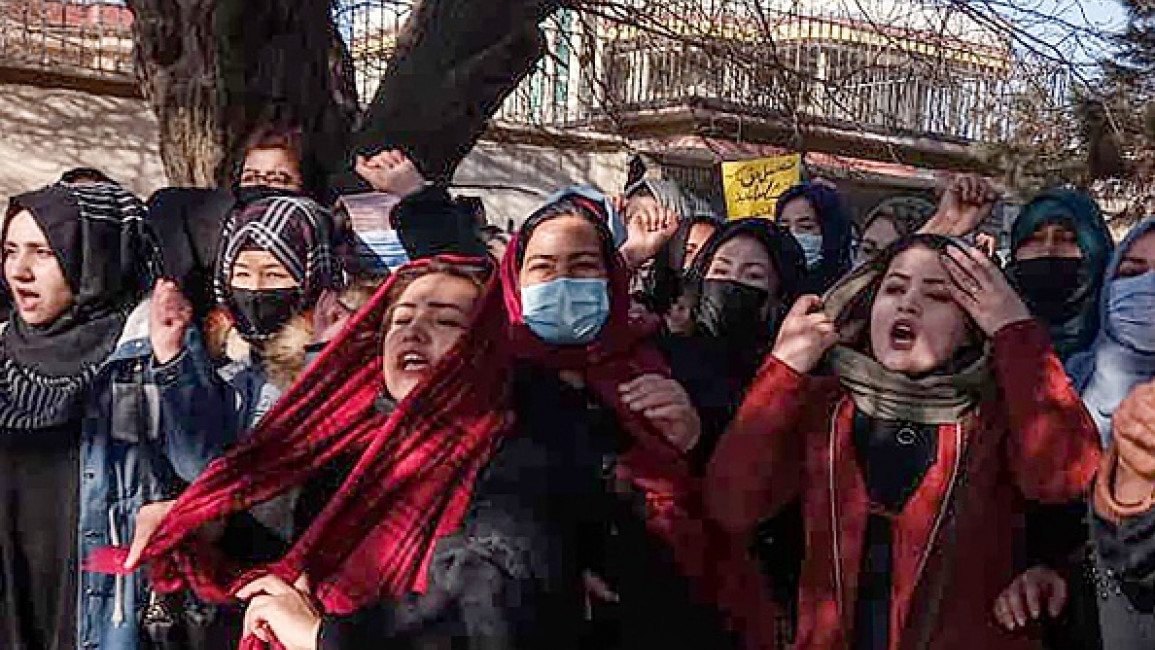
Male professors are standing alongside their female colleagues across Afghanistan [Getty images]
A Kabul university professor ripped up his academic diplomas on live television in Afghanistan on Tuesday, in a show of defiance against the Taliban’s recent move to ban women from higher education.
Ismail Mashal was in tears as he tore his degree certificates into pieces during a news broadcast on independent TV channel TOLOnews.
“After the closure of schools and universities in the face of my daughters and sisters, yesterday I took all my educational documents and tore them up in front of the media,” said Mashal after his appearance.
“My mother and father studied for more than 15 years and I was able to teach in several universities for 14 years. Now under the government of the Islamic Emirate, they tell me I must stay silent.”
“My friends say don't fight, don't go to the press because there is no freedom in this country. Every day my mother and father say they will kill you, Marwat your daughter will become an orphan,” said the Kabul professor.
At least 48 male Afghan professors have now resigned their roles in protest, from universities in Kandahar, Kabul, Paktia and elsewhere.
Last week, Taliban authorities stopped university education for women, sparking international outrage and demonstrations in Afghan cities.
On Saturday, they announced the exclusion of women from NGO work, a move that already has prompted four major international aid agencies to suspend operations in Afghanistan.
Despite initially promising a more moderate rule respecting rights for women and minorities when they took power last year, the Taliban have widely implemented their harsh interpretation of Islamic law, or Sharia.
They have banned girls from middle school and high school, restricted women from most employment and ordered them to wear head-to-toe clothing in public. Women are also banned from parks and gyms.
Afghan Medical Student Speaks Out About Taliban’s University Ban on Women
December 28, 2022
Nazrana Ghaffar Yousufzai
Roshan Noorzai
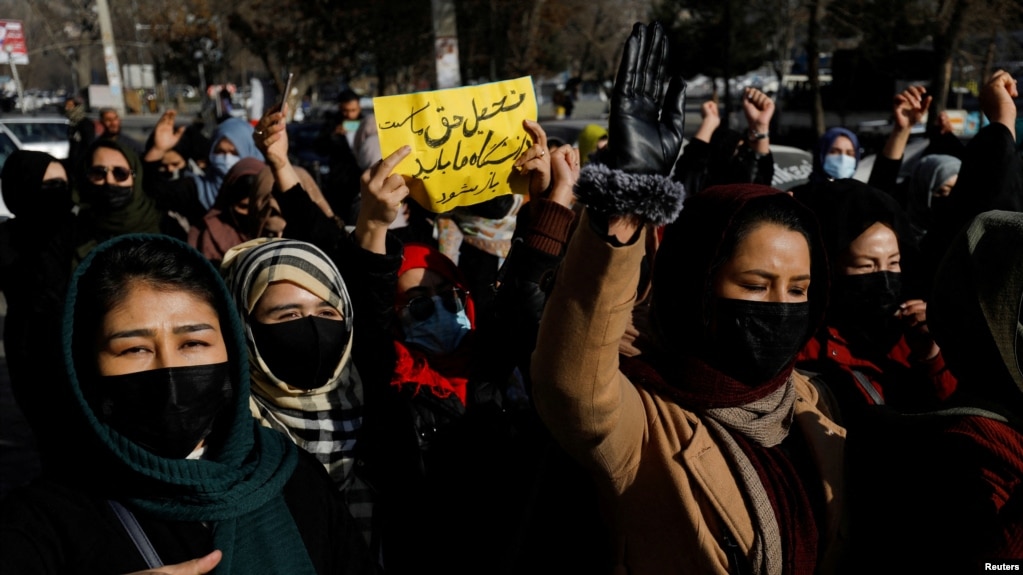
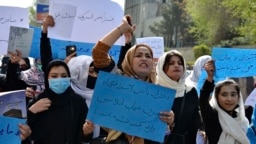
Taliban Ban Women From Universities in Afghanistan
“We have worked tirelessly to get an education. Now, we are deprived of our only hope in this country,” said Ghazal.
Taliban defend ban
The Taliban’s higher education minister defended the ban, saying that female university students “failed to comply” with gender-segregated classes and dress codes.
“We have instructed girls to wear hijab but they failed to comply. Instead, they wore dresses like they were going to wedding parties,” Neda Mohammad Nadeem told the Taliban-run state television.
“Girls were studying agriculture and engineering in defiance of Afghan honor and Islam,” he added.
The Taliban's decision to suspend girls' university education is the latest blow to the women's rights gains of the past two decades in Afghanistan.
After taking power in August 2021, the Taliban banned girls from secondary education and barred women from long-distance travel without a male chaperone, working outside, and going to public parks.
The Taliban ordered national and international NGOs on Saturday to immediately suspend female employees from work “until further notice.”
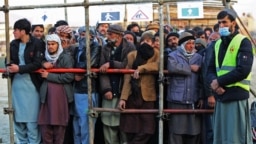
UN Urges Taliban to Reverse Ban on NGOs Employing Female Staffers
Protests continue
Dozens of Afghan women's rights activists and girl students Thursday staged a protest in some of the major cities in Afghanistan, demanding women’s access to education and employment.
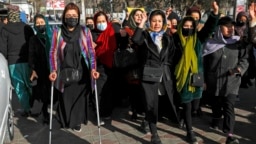
Afghans Protest Taliban's Education Ban for Women
Afghan women have protested the Taliban`s repressive rules regarding them since the group seized power in 2021.
There were also reports that male students boycotted exams after their female colleagues were not allowed to enter universities due to the ban on women’s university education. Dozens of teachers have resigned in response to the Taliban's edict.
Gains erased
Hamid Obaidi, a former spokesperson for Afghanistan’s ministry of higher education, told VOA that before the Taliban’s takeover, about 450,000 female students were enrolled at 39 public and 128 private universities.
He said women accounted for 33% of the students, 14% of teaching staff and up to 20% of employees at the institutions of higher education.
“The ministry planned to increase the number of women to ... 50% by 2025 in the higher education institutions,” Obaidi said. “Unfortunately, the Taliban returned, and once again the gates of schools and universities are shut on women.”
Shabnam Salihi, an Afghan women’s rights activist, said the Taliban’s ban will take its toll on women in Afghanistan.
“Stripping off women their fundamental right to education and learning will push them towards severe depression and mental health issues,” Salihi told VOA. “Women have been expressing their hopelessness and anger.”
International condemnation
Salihi also said the Taliban’s repression of women has “political motives.”
“The Taliban use Afghan women's fundamental rights as a bargaining chip in its negotiation with the international community,” she said.
No country recognized the Taliban as Afghanistan’s legitimate government although the group controls all parts of the country.
The international community has called on the Taliban to uphold their promises of respecting human rights, including girls' education.
The U.N. Security Council on Tuesday condemned the Taliban's new bans on women's university education and work for humanitarian agencies.
The United States has also condemned new bans enforced by the Taliban, saying that it is looking into additional measures to further isolate the group for its “appallingly bad” decision to ban girls’ university education.
“My leadership in Washington is taking a look at a range of actions to signal how the Taliban are following the wrong path,” Karen Decker, head of the U.S. diplomatic mission to Afghanistan, told journalists in a video conversation from her office in Doha, Qatar.

US Mulls Isolation of Taliban Over Education Ban Without Hurting Aid for Afghans
Ghazal, the young medical student, urged the international community to put further pressure on the Taliban regarding women’s education.
“We can’t do anything but hope that the international community will use its leverage over the Taliban to reopen schools and universities,” she said.
This story originated in VOA’s Pashto service.
December 28, 2022
Nazrana Ghaffar Yousufzai
Roshan Noorzai

Afghan women chant slogans in protest against the closure of universities to women by the Taliban in Kabul, Dec. 22, 2022.
Twenty-one-year-old Zamzama Ghazal was at her sister’s graduation ceremony when she heard about the Taliban’s ban on women’s university education.
“It was a painful sight,” said Ghazal, a fourth-year medical student at Shifa University in Kabul. “Instead of celebration, there were tears and grieving. All girls were crying, hugging, and consoling each other.”
Ghazal wanted to be a physician as her home country is in “dire need of female doctors.”
“It was my childhood dream to become a doctor. We had many hurdles. There were financial problems. The culture was not very supportive. But I was able to finish school and get into medical school.”
But she “now feels helpless,” after the Taliban, the de facto rulers of the country, last week ordered public and private universities to suspend women's access to universities until “further notice.”
Twenty-one-year-old Zamzama Ghazal was at her sister’s graduation ceremony when she heard about the Taliban’s ban on women’s university education.
“It was a painful sight,” said Ghazal, a fourth-year medical student at Shifa University in Kabul. “Instead of celebration, there were tears and grieving. All girls were crying, hugging, and consoling each other.”
Ghazal wanted to be a physician as her home country is in “dire need of female doctors.”
“It was my childhood dream to become a doctor. We had many hurdles. There were financial problems. The culture was not very supportive. But I was able to finish school and get into medical school.”
But she “now feels helpless,” after the Taliban, the de facto rulers of the country, last week ordered public and private universities to suspend women's access to universities until “further notice.”

Taliban Ban Women From Universities in Afghanistan
“We have worked tirelessly to get an education. Now, we are deprived of our only hope in this country,” said Ghazal.
Taliban defend ban
The Taliban’s higher education minister defended the ban, saying that female university students “failed to comply” with gender-segregated classes and dress codes.
“We have instructed girls to wear hijab but they failed to comply. Instead, they wore dresses like they were going to wedding parties,” Neda Mohammad Nadeem told the Taliban-run state television.
“Girls were studying agriculture and engineering in defiance of Afghan honor and Islam,” he added.
The Taliban's decision to suspend girls' university education is the latest blow to the women's rights gains of the past two decades in Afghanistan.
After taking power in August 2021, the Taliban banned girls from secondary education and barred women from long-distance travel without a male chaperone, working outside, and going to public parks.
The Taliban ordered national and international NGOs on Saturday to immediately suspend female employees from work “until further notice.”

UN Urges Taliban to Reverse Ban on NGOs Employing Female Staffers
Protests continue
Dozens of Afghan women's rights activists and girl students Thursday staged a protest in some of the major cities in Afghanistan, demanding women’s access to education and employment.

Afghans Protest Taliban's Education Ban for Women
Afghan women have protested the Taliban`s repressive rules regarding them since the group seized power in 2021.
There were also reports that male students boycotted exams after their female colleagues were not allowed to enter universities due to the ban on women’s university education. Dozens of teachers have resigned in response to the Taliban's edict.
Gains erased
Hamid Obaidi, a former spokesperson for Afghanistan’s ministry of higher education, told VOA that before the Taliban’s takeover, about 450,000 female students were enrolled at 39 public and 128 private universities.
He said women accounted for 33% of the students, 14% of teaching staff and up to 20% of employees at the institutions of higher education.
“The ministry planned to increase the number of women to ... 50% by 2025 in the higher education institutions,” Obaidi said. “Unfortunately, the Taliban returned, and once again the gates of schools and universities are shut on women.”
Shabnam Salihi, an Afghan women’s rights activist, said the Taliban’s ban will take its toll on women in Afghanistan.
“Stripping off women their fundamental right to education and learning will push them towards severe depression and mental health issues,” Salihi told VOA. “Women have been expressing their hopelessness and anger.”
International condemnation
Salihi also said the Taliban’s repression of women has “political motives.”
“The Taliban use Afghan women's fundamental rights as a bargaining chip in its negotiation with the international community,” she said.
No country recognized the Taliban as Afghanistan’s legitimate government although the group controls all parts of the country.
The international community has called on the Taliban to uphold their promises of respecting human rights, including girls' education.
The U.N. Security Council on Tuesday condemned the Taliban's new bans on women's university education and work for humanitarian agencies.
The United States has also condemned new bans enforced by the Taliban, saying that it is looking into additional measures to further isolate the group for its “appallingly bad” decision to ban girls’ university education.
“My leadership in Washington is taking a look at a range of actions to signal how the Taliban are following the wrong path,” Karen Decker, head of the U.S. diplomatic mission to Afghanistan, told journalists in a video conversation from her office in Doha, Qatar.

US Mulls Isolation of Taliban Over Education Ban Without Hurting Aid for Afghans
Ghazal, the young medical student, urged the international community to put further pressure on the Taliban regarding women’s education.
“We can’t do anything but hope that the international community will use its leverage over the Taliban to reopen schools and universities,” she said.
This story originated in VOA’s Pashto service.
No comments:
Post a Comment